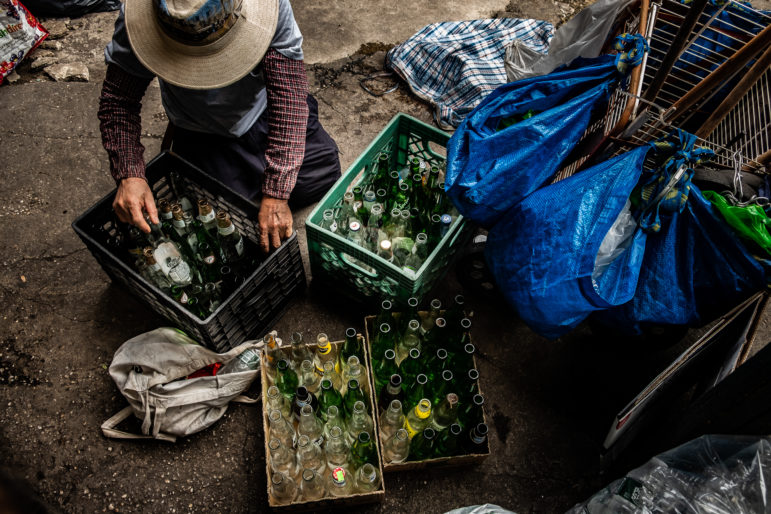“To ensure a livable planet for future generations, reducing plastic from the outset is the best way to gain control of how much we’re polluting our air, land, waters, and ourselves. Legislation now is key.”

Adi Talwar
Plastic has become a matter of public health.
Nearly every week a new study is published documenting how microplastics and nanoplastics have been found in our food, water, hearts, lungs, and bloodstream. Over 10,000 chemical additives are used to produce plastic, many of which have been identified as carcinogens and endocrine disruptors.
A recent study by Consumer Reports found two common types of plastic chemicals—bisphenols and phthalates—in nearly 100 different foods and food packaging. These are known endocrine disruptors that can interfere with the body’s production and regulation of hormones, resulting in an increased risk of neurological development disorders, birth defects, infertility, obesity, and autoimmune diseases like diabetes.
Two New York legislative bills will tackle this ubiquitous plastics problem—and save taxpayers money.
The first is the Packaging Reduction and Recycling Infrastructure Act (S.4246-B/A.5322-B), introduced by Senator Pete Harckham and Assemblymember Deborah Glick, which bans the use of 15 toxic chemicals in plastic production, including bisphenols and phthalates. Some of these toxins are used in products targeting children, especially in pre-packaged lunch products. This groundbreaking legislation will mandate aggressive reductions in plastic packaging implemented in phases over the next 12 years. Seventy percent of the remaining packaging must be truly recyclable. Currently, very little plastic waste is recycled. In fact, the recent rate is a dismal 6 percent.
New York City is projected to spend $477 million in 2025 exporting its trash to incinerators and landfills out-of-state and to the Finger Lakes district in upstate New York. Most of Manhattan’s trash reaches its final destination in a polluting incinerator in Newark, New Jersey. A third of this trash is composed of plastic and other packaging waste.
By establishing a policy known as extended producer responsibility, the financial burden of recycling plastic and paper waste will fall on corporations rather than taxpayers. Shifting the high cost of managing this waste from municipalities to the companies generating it will save local governments—and taxpayers—money. It will also incentivize companies to redesign their packaging and to institute reuse and refill systems to minimize the cost of disposal.
The second bill, the Bigger, Better Bottle Bill (S.237-B, A.6353) updates the 40-year-old Returnable Container Act by raising the container deposit from 5 cents to 10 cents and including wine, spirits, hard cider, and most non-carbonated beverages in the deposit system. States with higher redemption fees have significantly higher rates of return. It’s estimated that with a 10-cent deposit fee, the beverage container redemption rate in New York could reach 90 percent.
This legislation will also directly benefit the 10,000 “canners” in New York City who supplement their income by collecting and redeeming beverage containers. Canners are often low-income folks, immigrants, people experiencing homelessness, women, and the elderly. Forty years after the original bottle bill passed — at a time when the minimum wage was $3.35 an hour — these marginalized individuals are still being paid the same amount. Canners provide an important service to New York City and deserve a raise.

Adi Talwar
A canner collecting bottles for recycling in 2021.Financially incentivizing more consumers to return beverage containers would also reduce the pollution that is an all-too-common sight in New York City streets. This trash is more than just an eyesore; it clogs our drainage systems and exacerbates the severe flooding on our streets and in our subways from torrential rains and hurricanes. Because of the climate crisis, we can expect these extreme weather events to occur more frequently in the future.
Reducing plastic production is also an environmental and climate justice imperative. The sourcing, production, and disposal of plastic not only contributes significantly to the climate crisis but also has a disproportionate impact on the mostly low-income communities and communities of color who live near fracking sites, petrochemical plants, landfills, and incinerators.
We know the world can only reach its greenhouse gas emission reduction goals by effectively addressing the environmental impact of plastic. If plastics were a country, it would be the fifth largest producer of greenhouse gases. Nearly all plastic produced in the United States is a byproduct of fracked gas, and, largely because of the fracking boom, plastic production has doubled in the last 20 years and is expected to almost triple by 2050 if nothing is done to stop it.
To ensure a livable planet for future generations, reducing plastic from the outset is the best way to gain control of how much we’re polluting our air, land, waters, and ourselves. Legislation now is key.
Harvey Epstein is a member of the NYS Assembly representing Manhattan’s east side; Jane Selden is the chair of WasteNøt at 350NYC; Victoria Augustine is a member at Beyond Plastics.









One thought on “Opinion: NY State Legislature Must Act to Curb the Perils of Plastic”
My A/M makes a lot of sense here. The caner bill could produce an immediate clean-up and recycling benefit and should be passed immediately too. Would an amendment to provide more plastic bottles and cans only trash bins on the streets help avoid the messy and dangerous process of teasing out bottles and cans for recycling?
Waste to power generation should get pushed for longer-term solution, getting rid of poisoness dioxins and other pollutants and recycling the metal slag that accumulates at the bottom of the waste-to-power converter, where electric arc temperatures can reach the temperature of the sun.
Current recycling methods – even with perfect consumer compliance that would raise the figure well above the 6% cited in the article – will still never be enough to clean up our plastic waste. We need biodegradable plastics, discouragement of single use plastics through back to manufacturer charges as suggested by A/M Epstein, etc.
These are good measures and need to be acted upon promptly.